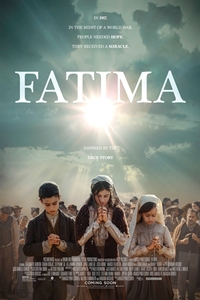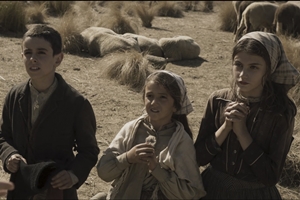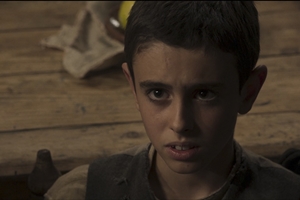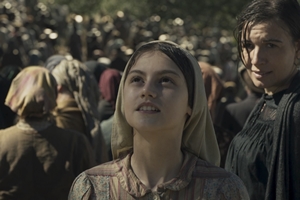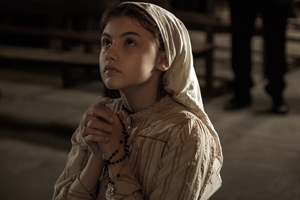Canada: Friday, August 28, 2020
Nationwide: Friday, August 28, 2020
Picturehouse Entertainment LLC
for some strong violence and disturbing images
http://www.fatimathemovie.com/
In 1917, outside the parish of Fátima, Portugal, a 10-year-old girl and her two younger cousins witness multiple visitations of the Virgin Mary, who tells them that only prayer and suffering will bring an end to World War I. As secularist government officials and Church leaders try to force the children to recant their story, word of the sighting spreads across the country, inspiring religious pilgrims to flock to the site in hopes of witnessing a miracle. What they experience will transform their quiet lives and bring the attention of a world yearning for peace. Based on real-life events.
Cast & Crew
Movie Cast
Movie Crew
User Reviews
Public Reviews - 1 Reviews
-
Gregory M. - Rated it 3 out of 5
"Fátima" In 1917, outside the parish of Fátima, Portugal, Lucia Santos (Stephanie Gil), a 10-year-old shepherd and his two younger cousins Jacinta (Alejandra Howard) and Francisco Marto (Jorge Lamelas), witness multiple visitations of 'The Virgin Mary' (Joana Ribeiro), who tells them that only prayer and suffering will bring an end to 'World War I'. As secularist government officials and 'Church' leaders try to force the children to recant their story, word of the sighting spreads across the country, inspiring religious pilgrims to flock to the site in hopes of witnessing a miracle. What they experience will transform their quiet lives and bring the attention of a world yearning for peace. In modern-day Portugal, author and noted skeptic Professor Nichols (Harvey Keitel) visits a convent in the riverside city of Coimbra, where Sister Lúcia (Sônia Braga), an elderly nun, recounts the story of her role in an historic event that took place in 1917. The conversations between pragmatic academic and the spiritual ascetic illuminate a decades-old mystery and set the stage for an inspiring story that has fascinated millions for more than a century. While wandering in a cave near her home in 'The Hamlet Of Aljustrel', on the outskirts of Fátima, Portugal, 10-year-old Lúcia is visited by an angel who shows her a vision of a battlefield. 'World War I' is raging across Europe and claiming the lives of many young men in Lúcia’s village. In the vision, Lúcia sees her brother, Manuel (João Arrais), a soldier at the front, caught in an explosion. Later, while tending her family’s flock of sheep, Lúcia and her younger cousins Jacinta and Francisco are visited by another apparition, this time of 'The Virgin Mary'. 'The Lady of The Rosary', as she calls herself, tells the children they must pray and suffer in order to bring an end to the deadly conflict. She also tells them she will return to the same spot every month for six months. Like many in the town, Lúcia’s devout mother, Maria (Lúcia Moniz), doesn’t believe the children’s story and chastises Lúcia for lying. But as the mayor, Artur (Goran Višnjić), and 'Church' officials try to convince the youngsters to recant their story, word of the sighting spreads. Pilgrims from across the country flock to Fátima hoping to have their prayers answered, but only the children are able to see or hear the apparitions. As more people come, the pressure mounts on officials of the newly installed secularist government to refute the children’s testimony. Artur eventually resorts to imprisoning Lúcia and her cousins, hoping to have them declared insane. But the psychiatrist he enlists to examine them finds no evidence to support that claim and they're freed. On the day of Mary’s final visit to Fátima, tens of thousands of believers arrive, hoping to witness a miracle that will convince them of her existence. What they experience is still talked about to this day and the site remains one of the world’s most popular destinations for 'Catholic' pilgrims. When the film opens Professor Nichols, a religious scholar, interviews the now 80-year-old Sister Lúcia. A skeptical academic, Nichols wants to hear the tale of Fátima from a firsthand witness. The character, though fictional, is essential to bringing contemporary viewers into the movie. He doesn’t believe that miracles happen, but he knows there are things that are unexplainable, and he wants to know more about them. He and Sister Lúcia find some common ground on how such things can impact the world. In Nichols case, he doesn’t think the events came from the hand of 'God'. And in her case, she does, clearly. The character represents the skeptical part of the audience, which will include a lot of people. Sister Lúcia projects the spiritual depth that Nichols struggles to understand. In the film the character is the one person left who witnessed it all. One moment that stands out is when she tells Professor Nichols, ‘I can only give you my testimony, I don’t have answers for everything. Lúcia is a humble kid devoted to her faith and she just could never believe that she could be so blessed as to experience 'The Virgin Mary'. For a 10-year-old to be entrusted with this incredible message and then have people doubting her, to endure having her family and her town turn against her. After the visitation from 'The Virgin', Lúcia’s life changes drastically and permanently. The harmless farm girl becomes an enemy of the people, the state and 'The Church'. Everyone starts to judge her and her cousins. That’s pretty hard for a 10-year-old. Lúcia’s acceptance of this miracle is almost miraculous in itself. She has a vision and she seems to believe it’s quite normal. There's an incredible story behind this miracle, the story of the children and their experiences of 'The Virgin Mary', as well as their ultimate persecution within their homes and their local communities, by the government and 'The Church'. But they all remained true to their mission, even after their abduction by the authorities and interrogation under the threat of death. Whether they truly experienced the apparitions or not, whether the miracle happened or not, we continue to relate to Lúcia and her quest. Francisco is Lúcia’s younger cousin. He's a really humble and nice kid. He can see 'The Virgin' but not hear her like Jacinta and Lúcia do, so he’s a bit confused. But he stands by Jacinta and Lúcia to make everyone believe that what they say is true. Jacinta is competitive and pretty smart. The bond all three kids developed during rehearsal carried over to the screen. You see three poor shepherd children living with their flock in the hills. Lúcia’s mother is a tricky character. She’s really under pressure. It’s not that she doesn’t believe in 'The Virgin Mary'. It’s that she can’t imagine that 'The Blessed Mother' would appear to her daughter. Her humility prevented her from considering that a possibility. Artur (Goran Visnjic) is the mayor of the town. He’s a big man and brings that presence to the film. He towers over the children, both physically and in terms of authority. The character knows that hope, faith and prayer are powerful weapons. The establishment at the time is threatened by this, as is he. As mayor of the town where everything happens, he has to get to the bottom of the whole story. He does not believe the kids. He believes it's all superstition. Throughout 'The Catholic' world, 'The Portuguese' town of Fátima is renowned for the miraculous appearance of 'The Blessed Virgin' to three young shepherds in 1917. A small farming district at the time, it became internationally famous for the prophecies the children claimed to have received, making it a revered religious site visited by some six million pilgrims annually. That Fátima miraculous message of faith and peace, which galvanized the world over a century ago, is more important than ever. The story needs to be updated for modern audiences and the film needs to place the events in the context of 'Western Europe' in the early '20th Century'. What's happening then is critical to understand. There was huge anti-'Catholic' sentiment across 'The Iberian Peninsula'. Churches were being closed down in Spain and Portugal and they're hanging priests in effigy. They're in the middle of a military conflict unlike any the world had seen before. These three were giving a message of peace and belief at a time when people were in desperate situations. It seemed as if the war was never going to end, that it was going to keep expanding, that they're going to lose more loved ones. 'The Marto' siblings were recently canonized by 'The Catholic Church' and Lúcia is on the road to sainthood. Do we believe the words of the children or do we doubt them as the adults in their lives did? It’s a moving rendition of the beauty of innocence. Their love, their devotion and their faith continue to fascinate people. This story can be a universal bridge between people of all faiths. The innocence of these three kids help spread a message of peace and hope to an entire generation. The story of the children and 'The Lady Of Fátima' is as touching a tale of humankind’s reach for 'The Heavens' as any we know of. The conflict embedded in that reach for 'God' has involved every creature on our planet and beyond. Any human being living has at some time been a skeptic about religion and has journeyed for knowledge of religiosity. There’s nothing negative in helping other people and living in a kind, helpful way. What 'The Lady Of Fátima' represents, in her inspired simplicity, is an epicenter of spirituality, a catalyst for prayer and a bridge between humanity and the divine. It's no coincidence that people have sung extraordinary songs that evoke her over the centuries. She brought an undeniable message of peace and universal fellowship. 'The Shrine Of Fátima' welcomes all independent initiatives and projects that see the history and message of Fátima as a source of artistic creation. Inspired by the story of 'The Blessed Virgin Mary’s' appearances to three children, the movie "Fátima" shows why it's still possible for humanity to believe in divine intervention, even in our contemporary world. written by Gregory Mann
